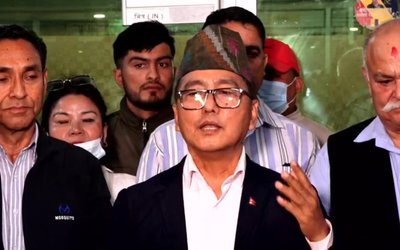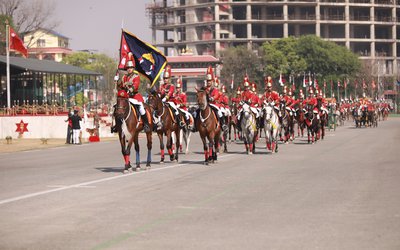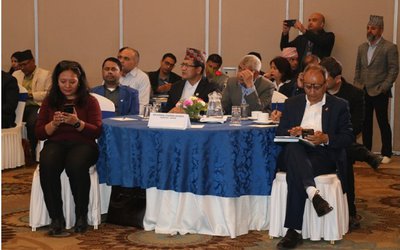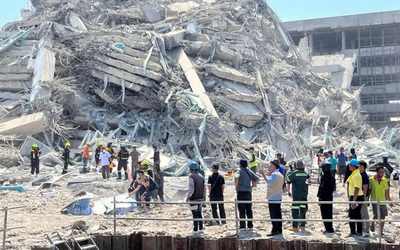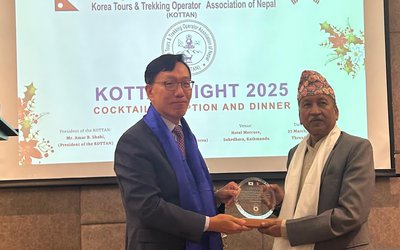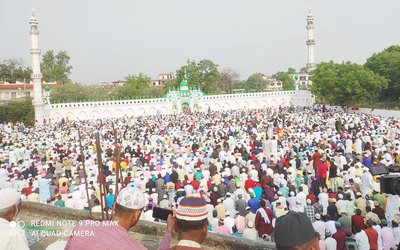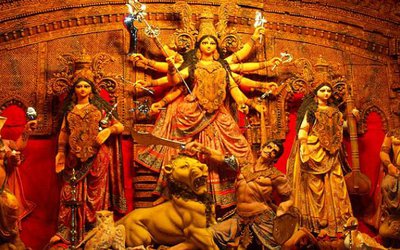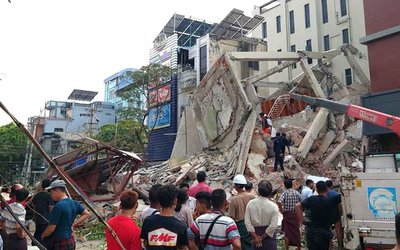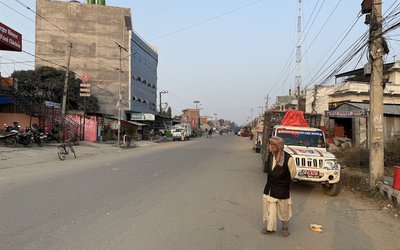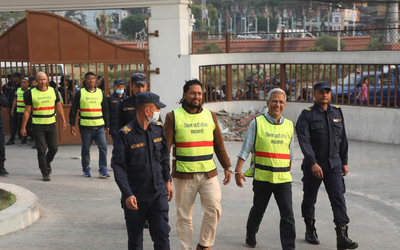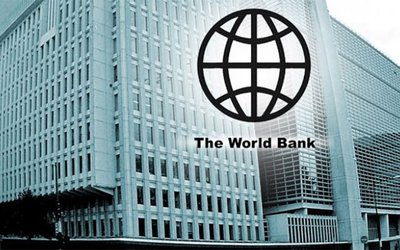
Although a geographically small state of Gulf, Qatar has made an immense contribution to Nepal’s economic development in various ways. By providing employment to almost half a million Nepalese, in various categories, Qatar’s capital Doha is now a gateway to Nepal, linking the Nepalese capital Kathmandu with the rest of the world through its National Flag Carrier Qatar Airways . Today, Qatar is the hub for all kinds of Nepalese to travel to different parts of the world by Qatar Airlines.
This was reflected in a ceremony organized to celebrate the National Day of the State of Qatar and the commemoration of Sheikh Jassim Bin Mohammad Al-Thani, the founder of state of Qatar. By inviting a large number of people from different walks of Nepalese life, Ambassador of Qatar to Nepal Ahmed Jasim Al Hamar showed the importance given to Nepal by his country.
By attending the ceremony, vice president of Nepal Parmanand Jha, chief guest, showed how Nepal valued its relations with Qatar.
“Relations of Nepal and Qatar are based on mutual trust. As it provides employment to a large number of Nepalese, Qatar matters a lot,” said Minister of Labor and Employment.
As the prices of petroleum products continue to decline and the future of two million Nepalese migrant workers is uncertain in different parts of the world, Qatar’s companies have assured Nepalese that there is no need to panic.
At a time when there is a growing number of people demanding to send semi-skilled workers in foreign employment, Qatar is the only country in Gulf to have higher skilled workers, including Nepalese engineers, doctors, overseers and senior level people in hotel industry, airlines and other services sector.
“The current state shows that the demand of skilled and semi skilled workers in Qatar is going up compared with other countries in the region,” said spokesperson of Ministry of Labor and Employment.
Although very few people notice, the Qatar Foundation with association of local NGOs is also supporting Nepalese community in various districts. Qatar Foundation has supported (ROTA), which is fostering the spirit of volunteerism in Qatar to send 24 volunteers on a 10-day visit to a ROTA Project in Nepal that supports the role of schools in Disaster Risk Reduction.
Working in 22 villages in the Kailali District of western Nepal, the Vodafone Qatar-Rota partnership, through the Disaster Risk Reduction (DRR) project, has improved the lives of thousands of students and teachers in many schools since the mission started in 2010.
Departing Doha on 19 September, the ROTA volunteers will participate in a focused activity program featuring student-led activities in non-formal centers of education, and deliver a series of workshops for the Nepali students. During the Trip, volunteers will also support the Saraswarti Primary School in Dhangadi in the far western Kailali Region of Nepal by facilitating classes for students in subjects such as Art, English, Qatari Culture, Environmental Awareness and Sport.
Volunteers assist Nepali children with local translators in the classes. There will be around 6 contact work hours per day followed by organized cultural activities that focus on the team building within the local community.
“Qatar Foundation is also supporting Nepalese social sector through local charity organizations showing that they also care about the welfare of workers,” said Dr. Ganesh Gurung, former member of National Planning Commission in a program Foreign Employment: Enhancing Productivity, Safety and Dignity and Socio-Economic Impacts in Nepal organized by Institute of Foreign Affairs.
Among the Gulf countries, Qatar has established itself as a country to work in the areas of global concern. It held the UNFCCC’s Conference of Parties (COP) meeting in 2012. Similarly it is also taking part in middle east peace process providing necessary support. This makes Qatar unique among the Gulf states.
Qatar In Sports
Qatar has enjoyed unprecedented global recognition in sport in recent years and continues to advance through targeted efforts aimed at creating a safer, healthier and more peaceful society.
Qatar invests heavily through the Qatar Olympic Committee (QOC) and its partner clubs, sports federations, the Aspire Zone Foundation and other strategic allies, to increase the supply of sport and active recreation facilities, develop athletes, host international competitions and raise awareness of the benefits of sport and physical activity.
The Qatar National Vision 2030 (QNV 2030) sets out the principles for Qatar’s sustainable and balanced development, based on a vibrant and prosperous economy that provides economic and social justice, stability and equal opportunity for all.
In order to operationalize the goals and objectives of QNV 2030 and to provide a coherent basis for planning, Qatar’s first National Development Strategy 2011-2016 (NDS) is being prepared. The Sports Sector Strategy 2011-2016 (SSS) is one of fourteen sector strategies that will be integrated into the NDS.
The QNV 2030 commits to maintaining harmony between economic growth, social development and environmental management, as well as improving people’s quality of life. The QNV 2030’s social development pillar pledges to build a safe, secure and stable society that is centered on effective institutions and leads to the promotion of tolerance, benevolence, constructive dialogue and openness.
Physical activity occupies a central role in enriching lives, with participation in sport being a source of health and enjoyment for those who join as players, volunteers, coaches, observers, officials or administrators. It is often abiding element in the social and cultural fabric of society.
Qatar will continue to place emphasis on sport, especially to meet the challenges presented by a rapidly increasing and youthful population, cultural change and more affluent lifestyles. Like many developed societies, Qatar’s health system is challenged by the cost of treating chronic preventable diseases borne from sedentary lifestyles and a lack of physical activity.
The increasing prevalence of obesity leading to hypertension, heart disease and diabetes, requires a whole-of government strategy starting with physical education and training in childhood, traversing through rigorous sports activity in adulthood and culminating in moderate physical activity at older ages.
Hosting of the FIFA 2022 World Cup in Qatar may be considered as an enabler that will support achievement of some of the goals of other sectoral strategies that are part of the National Development Strategy. For example, by using an eco-friendly green technology, diversifying sources of income by engaging the private sector, and through the development of sports tourism.
It will also contribute to raising the Qatar’s profile regionally and internationally, create job opportunities, build the capability of young people and produce efficient and productive workforce. Further it is expected to have a major impact on national sports through youth, providing high standards sport facilities and increasing the level of participation in sport and physical activity, including improved performance in sports.
In Qatar, the sports sector is playing an increasingly prominent role in shaping national identity and progress. The achievements thus far, including the successful staging of the 15th Asian Games in 2006 and other major sporting events, have helped change Qatar’s image in the world. Success in sports has become an inspiration for the whole society and contributes to an energized, confident and modernizing nation.
- IME GROUP: Expands Into Paper Industry
- Mar 24, 2025
- CPN UML: Instigated By India
- Mar 23, 2025
- ADB’S CHIEF ECONOMIST: Nepal Reduces Poverty
- Mar 11, 2025
- FM DR. DEUBA: A Successful Visit
- Mar 11, 2025
- MD GHISING: Target Of Personal Grudge
- Mar 09, 2025

